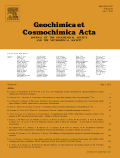
GEOCHIMICA ET COSMOCHIMICA ACTA
metrics 2024
Connecting Research, Discovery, and Understanding in Geochemistry
Introduction
GEOCHIMICA ET COSMOCHIMICA ACTA is a premier journal dedicated to advancing the fields of geochemistry and petrology, published by Pergamon-Elsevier Science Ltd. With its ISSN 0016-7037 and E-ISSN 1872-9533, this esteemed journal has been at the forefront of scientific inquiry since its inception in 1950, with a strong commitment to disseminating high-quality research through 2024. Its reputation is underscored by an impressive impact factor and a ranking of #8 out of 154 in Earth and Planetary Sciences according to Scopus, placing it in the 95th percentile of its category. GEOCHIMICA ET COSMOCHIMICA ACTA serves as a critical resource for researchers, professionals, and students alike, offering insights into the complex interactions of geological and cosmological processes. While the journal is not open access, it remains a vital conduit for innovative research, fostering the scientific community’s understanding of earth materials and their significance.
Metrics 2024
 2.28
2.28 4.50
4.50 5.10
5.10 280
280Metrics History
Rank 2024
Scopus
IF (Web Of Science)
JCI (Web Of Science)
Quartile History
Similar Journals
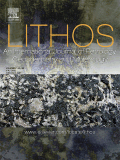
LITHOS
Pioneering Discoveries in Geochemistry and Petrology.LITHOS is a prestigious academic journal published by Elsevier, renowned for its contributions to the fields of Geochemistry and Petrology. As an integral platform since 1968, this journal focuses on advancing the understanding of the Earth's composition and processes, adhering to the highest academic standards as evidenced by its Q1 ranking in both Geochemistry and Petrology, and Geology. With an impressive impact factor and substantial visibility in scientific databases, LITHOS caters to a broad audience, including researchers and students eager to engage with cutting-edge studies. Although it is not an open-access journal, its scholarly rigor and relevance have established it as a leading resource for the latest findings and methodologies in Earth sciences. Notably, it ranks #41 in Earth and Planetary Sciences: Geology and #34 in Geochemistry and Petrology, demonstrating its significant influence within the academic community. The journal is based in the Netherlands and continuously opens avenues for innovative research through its commitment to excellence in the geosciences.
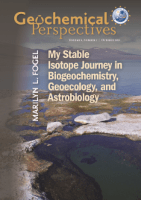
Geochemical Perspectives
Pioneering the Future of Geochemical Studies.Geochemical Perspectives, published by the European Association of Geochemistry, is a pivotal journal that caters to the dynamic field of geochemistry and its related disciplines. With an ISSN of 2223-7755 and an E-ISSN of 2224-2759, this journal serves as a vital platform for disseminating cutting-edge research and developments from 2012 to the present, and into 2024. Notably, the journal has established itself with impressive rankings, including Q2 in both Geochemistry and Petrology and Geology, and a Q3 standing in Environmental Chemistry for 2023, highlighting its significant contribution to these critical scientific areas. The journal's accessibility, although not open access, ensures that valuable insights and findings are shared within the academic community. Researchers, professionals, and students eager to explore innovative perspectives and applications in geochemistry will find this journal an essential resource in their pursuit of knowledge and advancement in the field.
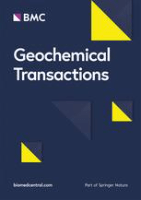
GEOCHEMICAL TRANSACTIONS
Unlocking the Secrets of Earth Through Geochemical ResearchGEOCHEMICAL TRANSACTIONS is an esteemed journal dedicated to the field of geochemistry and petrology, published by BMC in the United Kingdom. As a pioneer in open access publishing since its inception in 2000, the journal facilitates widespread dissemination of research findings to ensure that critical advancements in geochemical sciences are accessible to both academia and industry. With an impressive Scopus ranking of 62 out of 154 in the Earth and Planetary Sciences category, GEOCHEMICAL TRANSACTIONS holds a reputable position, reflected by its Q3 categorization within the influential quartiles, capturing the interest of its target audience. The journal aims to publish high-quality research articles, comprehensive reviews, and discussions that address contemporary challenges and advancements in geochemistry. Researchers, professionals, and students will find this journal an invaluable resource for staying up-to-date with the latest developments and fostering collaboration within the scientific community.

Geochemical Perspectives Letters
Illuminating the intersections of chemistry and geology.Geochemical Perspectives Letters, published by the European Association of Geochemistry, is a leading open-access journal that has been at the forefront of geochemical research since its inception in 2015. Based in France, this journal is dedicated to disseminating high-quality, original research and reviews across the fields of Environmental Chemistry, Geochemistry, and Petrology, and Geology. With an impressive Q1 ranking in multiple categories, and notable Scopus rankings placing it among the top-tier journals in Earth Sciences, Geochemical Perspectives Letters aims to foster scientific dialogue and collaboration among researchers and professionals. Its open-access model ensures widespread dissemination of knowledge, making it accessible to a diverse audience, including students and seasoned experts alike. As the journal continues to converge research insights from 2015 to 2024, it remains a pivotal resource for those striving to understand and address the complexities of our planet's geochemical processes.
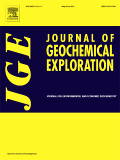
JOURNAL OF GEOCHEMICAL EXPLORATION
Pioneering Research for a Sustainable FutureJOURNAL OF GEOCHEMICAL EXPLORATION, published by Elsevier, is a leading journal in the fields of Geochemistry and Economic Geology, with a notable Impact Factor and a commendable performance demonstrated by its Scopus ranking, where it holds the 22nd position out of 154 in Geochemistry and Petrology and 11th out of 43 in Economic Geology. Founded in 1972 and set to converged through 2024, the journal serves as a vital platform for disseminating high-quality research, providing insights into the complex relationships between geological processes and geochemical phenomena. Its articles contribute significantly to the understanding of natural resource exploration and environmental geochemistry, making it an essential resource for researchers, industry professionals, and students alike. Although not an open-access journal, it offers a wealth of knowledge aimed at advancing the field's boundaries and fostering innovative research initiatives. As an established outlet for the latest findings and methodologies, the journal's contributions ensure it remains at the forefront of geochemical exploration.

LITHOLOGY AND MINERAL RESOURCES
Driving Innovation in Economic Geology ResearchLITHOLOGY AND MINERAL RESOURCES, published by PLEIADES PUBLISHING INC, is a specialized journal dedicated to advancing knowledge in the fields of economic geology, geochemistry, and petrology. With its ISSN 0024-4902 and E-ISSN 1608-3229, this journal has established itself as a critical resource for scholars and practitioners alike, examining the intricate relationships between lithology and mineral deposits, and their implications for resource management. As indicated by its positioning in the Q3 quartile for both economic geology and geochemistry and petrology in 2023, the journal is recognized for its valuable contributions to the scientific community, ranking #28 out of 43 in Economic Geology and #112 out of 154 in Geochemistry and Petrology according to Scopus. The journal's publication history reveals a rich tradition of excellence, as it has been continuously contributing to the field from 1984 to 2024. While it does not offer open access options, researchers and practitioners can easily engage with its robust body of work in effective ways to support their own studies and applications. The importance of LITHOLOGY AND MINERAL RESOURCES lies in its commitment to publishing high-quality research that informs practices in mineral exploration and environmental stewardship, making it an essential resource for anyone invested in the future of earth sciences.

GEOCHEMICAL JOURNAL
Unveiling the Complexities of Earth's ProcessesGEOCHEMICAL JOURNAL, published by the Geochemical Society of Japan, stands as a pivotal platform for researchers and professionals dedicated to the fields of geochemistry and petrology, as well as geophysics. With the ISSN 0016-7002 and E-ISSN 1880-5973, this journal has been disseminating cutting-edge research since its inception in 1966 and continues to provide invaluable insights into the complexities of Earth's processes. Currently categorized in the Q3 quartile for both Geochemistry and Petrology and Geophysics, the journal ranks in the 40th and 36th percentiles, respectively, as per Scopus metrics, reflecting its growing influence and relevance in the scientific community. The journal accepts a range of scholarly articles, aiming to foster a deeper understanding of geochemical phenomena while promoting interdisciplinary collaboration among academicians and practitioners. Although not open access, the GEOCHEMICAL JOURNAL's commitment to quality research and education underscores its vital role in advancing the discourse within geoscience.

Mineralogical Journal-Ukraine
Pioneering insights into energy and fuel technology.Mineralogical Journal-Ukraine is a key academic publication dedicated to advancing the field of mineralogy and geochemistry, under the esteemed auspices of the M.P. Semenenko Institute of Geochemistry, Mineralogy & Ore Formation of NAS Ukraine. Since its inception in 2019, this journal has established itself as an essential resource for researchers and professionals engaged in the study of energy, fuel technology, and the earth sciences, despite its present rankings reflecting a developing impact within these specific categories on Scopus. Published in Ukrainian and available in both print and online formats, the journal not only aims to disseminate high-quality research but also encourages inclusive access to vital findings in mineral exploration, petrology, and geochemical processes. With a commitment to excellence and an expanding scope of research, Mineralogical Journal-Ukraine stands as a pivotal platform for innovation and collaboration among scientists striving to understand the complexities of mineral formation and ore deposits.

GEOCHEMISTRY INTERNATIONAL
Connecting Researchers to the Heart of Earth SciencesGEOCHEMISTRY INTERNATIONAL, an esteemed journal published by MAIK NAUKA/INTERPERIODICA/SPRINGER, serves as a vital platform for researchers in the fields of geochemistry, petrology, and geophysics. With a deep history reaching back to its inception, the journal spans significant converged years from 1977 to 1978 and continues its publication through 2024. Although it currently does not offer Open Access options, its scholarly impact is underscored by an established reputation indicated by its Q3 categorization in both Geochemistry and Petrology and Geophysics for 2023. Researchers can leverage this platform to disseminate groundbreaking findings and engage with contemporary discussions in Earth and planetary sciences, where it ranks at the 39th and 32nd percentiles within its respective categories. The journal is an essential resource for professionals, students, and scholars seeking to deepen their understanding of geochemical processes and evolve scientific discourse within this dynamic field.
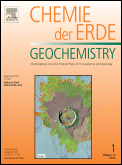
Geochemistry
Illuminating the Path of Geochemical DiscoveryGeochemistry is a distinguished academic journal published by Elsevier GmbH, focusing on the intricate study of geochemical processes across earth systems. With its ISSN 0009-2819 and E-ISSN 1611-5864, this journal serves as a crucial platform for scholars and researchers eager to disseminate their latest findings in geochemistry, petrology, and geophysics. The journal has established itself within the scientific community, achieving a Q2 ranking in both Geochemistry and Petrology as well as Geophysics, showcasing its significant impact and relevance—ranking 18th out of 165 in Geophysics and 26th out of 154 in Geochemistry and Petrology according to Scopus. From its inception in 1978 to its ongoing contributions through 2024, Geochemistry remains a vital resource for academic discourse and innovation in earth sciences. As an open-access title, it allows for broader dissemination of knowledge, promoting accessibility for researchers, students, and professionals. Whether you are engaged in theoretical research or applied studies, Geochemistry provides the insights necessary to advance our understanding of the planet's chemical complexity.